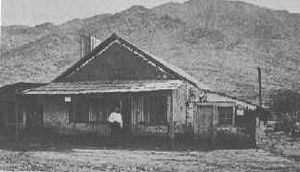Stanton, Arizona
| Stanton | |
|---|---|
| Populated place | |

Chuck Stanton in front of his store.
|
|
| Country | United States |
| State | Arizona |
| County | Yavapai County |
| Population | |
| • Total | ~3,500 |
| Time zone | MST (no DST) |
| Post Office opened | March 5, 1875 |
| Post Office closed | June 15, 1905 |
Stanton is a populated place in Yavapai County, Arizona, that is now used as an RV park. The town was originally a stagecoach stop known as Antelope Station, and was later renamed "Stanton" after the businessman and crook Chuck Stanton, who took over the town in the 1870s. Stanton is located about twenty miles north of Wickenburg, at the base of Rich Hill, near the ghost towns of Octave and Weaver.
The town of Stanton, like the towns of Octave and Weaver, owe their existence to a group of pioneers who discovered gold in the area in 1863. Led by the frontiersman Pauline Weaver, the explorers were camped along Antelope Creek when one of the men - a tracker named Alvaro - decided to go chasing after a runaway burro. After climbing to the top of what would become known as Rich Hill, Alvaro tripped over a pile of gold nuggets that were "as big as potatoes." Soon after, Pauline Weaver and a friend named Jack Swilling found another pile of gold on top of nearby Antelope Hill. Weaver said that gold was so plentiful in the area that he could pop nuggets out of the ground with a knife, and that one acre yielded nearly $500,000 in gold.
The 1863 strike transformed Antelope Station into a boomtown overnight. Originally just a small stage stop, by 1868 Antelope Station supported a population of 3,500 people. Chuck Stanton first arrived in town a few years later. He wasted no time in recruiting the help of some Mexican bandits so he could wipe out his competition and take control of the town. His first two victims were his neighbors, George "Yaqui" Wilson and William Partridge, both of whom owned a store and a stage stop. In August 1877, Stanton tricked Partridge into killing Wilson over some pigs, and so Partridge was arrested and sent to the Yuma Territorial Prison.
...
Wikipedia
